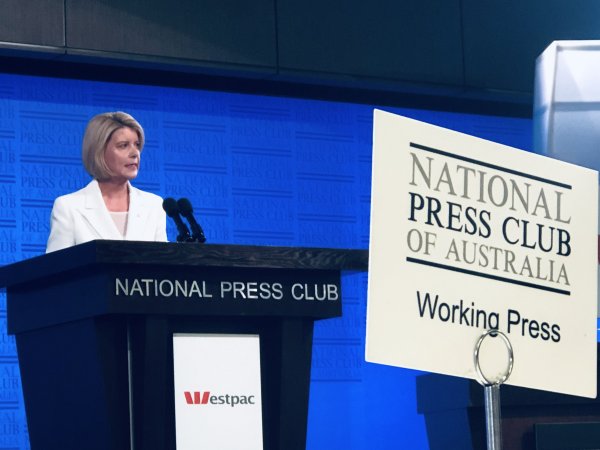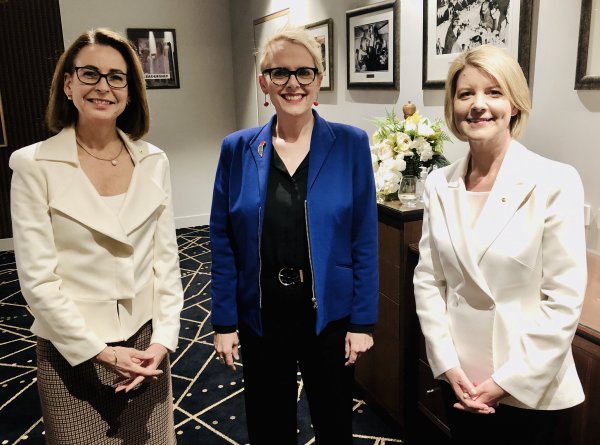Every day of every year, police across Australia respond to 657 domestic and family violence notifications. That is one every two minutes. On the 34th week of 2020, 34 women and 38 children have been murdered by a current or former intimate partner.
Speaking at the National Press Club on Wednesday, Natasha Stott Despoja said domestic violence was “one of the most heinous manifestations of gender inequality” and that COVID-19 was exacerbating what was already a national emergency.
“The very technique we are using to protect people from the virus can perversely impact the victims of domestic violence,” said Ms Stott Despoja, who is chair of Our Watch, a national domestic violence prevention organisation.
Domestic violence is one of the most heinous manifestations of gender inequality.
The emerging evidence is clear and unequivocal, she said.
“There is more violence in Australian homes. The severity of the violence has increased and COVID is being weaponised as a tool of abuse.”

Natasha Stott Despoja, chair of Our Watch.
An Australian Institute of Criminology survey from May, for example, found that of the women who had experienced physical or sexual violence by a current or former partner two thirds said the violence had started or escalated since the start of the pandemic.
“There is no doubt that stress-related factors, including financial pressures, family disruption, social isolation and disruption to people’s usual social and professional roles can compound and exacerbate the underlying conditions that lead to violence against women,” Ms Stott Despoja said.
“While these factors can increase the frequency and severity of violence they do not, of themselves, cause it and certainly don’t excuse it.”
Alcohol, drugs, mental illness and poverty do not cause domestic violence and it is not always helpful to think of “domestic violence perpetuated by dangerous men”.
Equally, she said, alcohol, drugs, mental illness and poverty do not cause domestic violence and that it was not always helpful to think of “domestic violence perpetuated by dangerous men”.
Ms Stott Despoja’s speech coincided with the six-month anniversary of the murder of Brisbane woman Hannah Clarke and her three children, Aaliyah, 6, Laianah, 4, and Trey, 3. She said the visceral nationwide outpouring of grief towards that incident was spurred by the ordinariness of it. Hannah Clarke was on a school run, in a leafy Brisbane suburb and had a seemingly “picture perfect” family.
“It teaches us a lot about domestic violence. Whatever our perceptions, family violence does not occur in a vacuum. Perpetrators don’t just simply snap and kill. It is usually the tragic end of a long history of fear, control and abuse.”
She noted that it was important to remember that not all men were violent and not only women were victims. However, men and women do experience violence differently. While 95% of all violent incidents are perpetrated by men, women, usually experience it from someone they know, and usually at home. More than half have children in their care at the time. Men, on the other hand, usually experience violence at the hands of a stranger.

Virginia Haussegger, Sabra Lane and Natasha Stott Despoja.
She said the rates of violence against indigenous women were “Australia’s national shame”.
“Three in five indigenous women have experienced physical or sexual violence at the hands of a male intimate partner. And indigenous women are 11 times more likely to die as a result of a violent assault.
“Ending violence against Aboriginal and Torres Strait Islander women must be a national priority,” she said.
Ending violence against Aboriginal and Torres Strait Islander women must be a national priority
Despite the statistics – and the invisibility of much of the violence – Ms Stott Despoja was optimistic the tables could be turned.
“Violence emerges in a broader social construct. This is a society where the underlying conditions of gender inequality means that violence is often condoned, trivialised or considered a private matter,” she said.
“If we want to stop this violence, we need to think about it as a social problem. And that is where prevention comes in.”

Stott Despoja with the team from the 50/50 by 2030 Foundation.
The job of primary prevention belongs to society as a whole – to governments, to corporations and organisations and to the community. Our national response to the pandemic could play an intrinsically important role.
“[It] can strengthen women’s economic security, our independence, our economic participation and decision-making in public life – all of which are measures that will help reduce violence against women.
“To end the story that is violence.”




